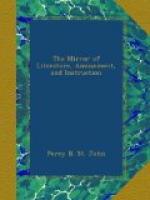Mr. Abraham Sharp, the astronomer, through his love of study, was very irregular as to his meals, which he frequently took in the following manner: a little square hole, something like a window, made a communication between the room where he usually studied, and another chamber in the house, where a servant could enter, and before this hole he had contrived a sliding board, the servant always placing his victuals in the hole, without speaking a word or making the least noise, and when he had leisure he visited it to see what it contained, and to satisfy his hunger or thirst. But it often happened that the breakfast, the dinner, and the supper remained untouched by him, so deeply was he engaged in his calculations and solemn musings. At one time after his provisions had been neglected for a long season, his family became uneasy, and resolved to break in upon his retirement; he complained, but with great mildness, that they had disconcerted his thoughts in a chain of calculations which had cost him intense application for three days successively. On an old oak table, where for a long course of years he used to write, cavities might easily be perceived, worn by the perpetual rubbing of his arms and elbows.[8]
SWAINE.
[8] Mr. Colton used to say that he wrote his treasurable, “Lacon: or, many things in a few words,” upon a small, rickety deal table. We perceive from Galignani’s Messenger, that Mr. Colton put an end to his existence, a few days since, at Fontainbleau, it is stated in consequence of the dread of a surgical operation which it had become necessary that he should undergo.
* * * * *
THE SELECTOR; AND LITERARY NOTICES OF NEW WORKS.
* * * * *
THE CONTRAST.
The title of Lord Mulgrave’s clever novel is sufficiently explained by the hero, Lord Castleton, a man of high refinement, marrying an unsophisticated, uneducated peasant girl. The scenes and incidents of her introduction into the fashionable world are replete with humour, yet true to the life. Thus, how naturally are her new Ladyship’s embarrassments told:—
“There were some points on which she would even have endeavoured to extract knowledge from the servants; but dreading, from her former habits, nothing so much as too great a familiarity in this respect, Castleton had made it one of his first desires to her, that she would confine her communications with them, to asking for what she wanted. To this, as to every other desire of his, she yielded, as far as she could, implicit obedience; but it was often a great exertion on her part to do so. Of her own maid she had felt from the first a considerable awe; and to such a degree did this continue, that she could not conceive any fatigue from labour equal to the burthen of her assistance. Being naturally of a disposition both active and obliging, it was quite new to her to have any thing done for her which she could do for herself. For some time she had as great a horror of touching a bell-rope, as others have in touching the string of a shower-bath; and when services were obtruded on her by the domestics as a matter of course, she had much difficulty in checking the exuberance of her gratitude.




